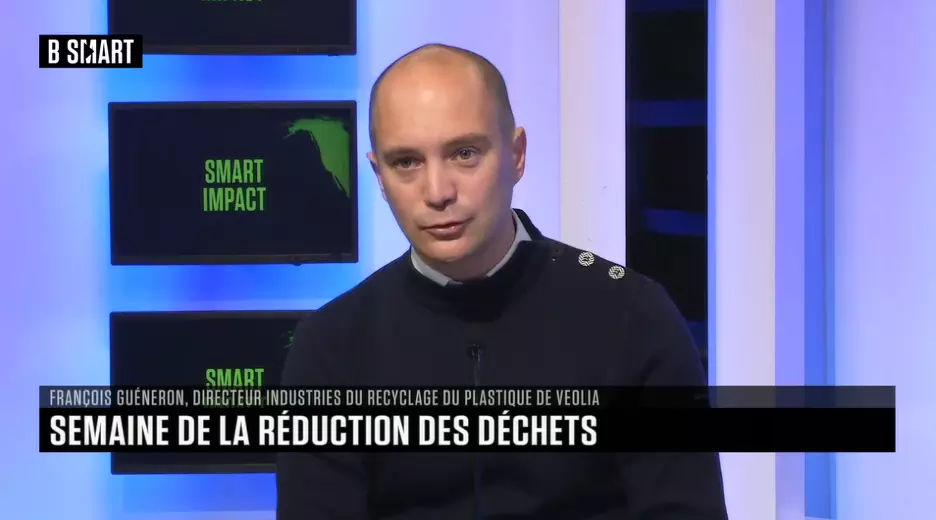The European Week for Waste Reduction kicked off on November 20, aiming at decisive collaboration between all players to tackle the continued generation of waste that is threatening our planet. On this occasion, Veolia emphasizes the role of new industrial collaborations and the necessary evolution of European regulations relating to the circular economy.
Eco-design increases the circularity of materials
The frontier between the world of waste and products is becoming an industrial issue: all products should be eco-designed to enable us to reduce, reuse and recycle waste. With this winning trio, the principles of the circular economy are applied to “close the loop” of the material. The quantity of waste is minimized, reuse is facilitated and the material can be recycled. As soon as a product arrives on the market, the manufacturer must plan for the treatment of waste, from collection to recycling. And for non-recyclable residues, specific treatment is necessary to minimize the impact.
By participating in several industrial alliances and platforms, Veolia helps ensure that products are designed to minimize waste and to reintegrate the maximum amount of recycled materials into the production cycle. This approach, which is beneficial for the environment and the economy, must then be taken up in a new regulatory framework, explains Michaël Mansuy, Public Affairs Director - Waste Management.

“At the end of its life, the product will now pass from the grave to the cradle”
Since the first European framework directive in 1975, the regulations have evolved significantly. In addition to ambitious recycling rates, they now take into account the entire life cycle of the product which includes the waste phase and the reincorporation of recycled material in the manufacturing of new products.
“The single-use plastics directive imposes a minimum content of recycled plastic in the manufacture of bottles by 2025 and 2030. More recently, the proposal for a regulation on batteries covers the reuse, recycling, reincorporation of recycled salts, and the efficiency of the material. In the near future, revisions to the packaging and end-of-life vehicle guidelines should ensure that these products largely pass from grave to cradle, or even avoid the grave altogether. Veolia fully supports this objective”, specifies Michaël Mansuy.
Reduce the impact of waste as much as its volumes
Hazardous substances also have an impact on the environment. For Veolia, this means limiting them or treating them adequately through decontamination. In this sphere, European decision-makers also have a crucial role to play in reducing the production and dangerousness of this waste.
Recycling and disposal of single-use plastics

Interviewed on the Smart Impact show (of B Smart TV) on November 25, Francois Guéneron, Head of Industrial Plastics Recycling in France, at Veolia, explains:
Education is part of the challenge to be met in order to avoid single-use plastics: we have to make people understand the end of life and the reuse of plastics. And the main issues for plastics are collection and consumer behaviour.
Recycled plastic is not the only solution, but its use emits 70% less CO2 than that from petrochemicals. Eco-design is the key. We need to manufacture mono-material products to more easily extract plastics from waste. Once recycled, a mixture of plastics does not achieve sufficient characteristics to be reused in the same products.
To develop the use of secondary raw materials, this must be taken into account from the product design stage. For example, we must limit the number of colours of plastics, because by mixing all the colours of the rainbow, we obtain a grey recycled plastic. We also have to look for plastics that are not yet recycled, such as your children's slide which is taken to the tip and is not recycled. And for that, the business model must be viable with sufficient volumes to amortize the investments.
Some years ago now, Veolia organized a sector to recycle a wide range of different plastics. If manufacturers choose these plastics when designing their product, they will be recycled and reincorporated into new products.
(Replay of the Smart Impact broadcast of November 25: https://www.bsmart.fr/emissions/smart-impact (in French only - watch from 10.38).
More information
> Veolia, Groupe Renault and Solvay join forces to recycle end-of-life EV battery metals in a closed loop
> Plastics recycling, a major environmental issue
> Veolia's expertise in waste management
> Co-development of industrial quality postconsumer recycled plastic: the example of Groupe SEB and Veolia, an article from the Facts review by the Veolia Institute on “Industry and waste: toward the circular economy”
> European Week for Waste Reduction (EWWR)

